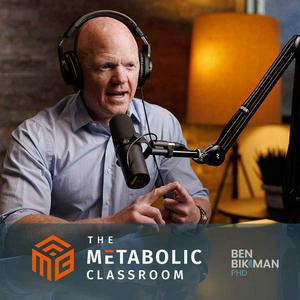📢 Ask Dr. Bikman’s Digital Mind (multilingual):
https://benbikman.com/ben-bikmans-digital-ai-mind
📢 Dr. Bikman’s Community & Coaching Site: https://insuliniq.com
Topic:
Bile acids are powerful hormone-like signaling molecules that regulate liver fat, glucose production, insulin sensitivity, energy expenditure, inflammation, and GLP-1 release through FXR and TGR5 receptors. Gallbladder function and bile acid signaling play a far greater role in metabolic health than most people realize.
Summary:
Ben explores a largely overlooked metabolic regulator: bile acids. While bile is commonly understood as a digestive fluid that helps emulsify fats, bile acids are now recognized as powerful hormone-like signaling molecules that influence insulin sensitivity, mitochondrial function, thyroid hormone activation, inflammation, GLP-1 release, and fat cell behavior.
Dr. Bikman explains the remarkable efficiency of enterohepatic circulation, where bile acids are reabsorbed and recycled multiple times per day. This recycling process allows bile acids to interact with key receptors — FXR (a nuclear receptor) and TGR5 (a G-protein coupled receptor) — triggering metabolic effects throughout the body.
Activation of FXR reduces liver fat production, improves hepatic insulin sensitivity, lowers glucose output, and stimulates FGF19, which further suppresses excess glucose production. TGR5 activation increases energy expenditure via thyroid hormone activation in brown fat and muscle, stimulates GLP-1 release in the intestine, reduces inflammation in immune cells, and supports healthier adipose tissue signaling.
Ben also examines the metabolic consequences of gallbladder removal. Without the gallbladder’s concentrated, timed bile release, signaling patterns change, and epidemiological data suggest increased risk of metabolic syndrome and fatty liver. Finally, Dr. Bikman discusses bile supplements such as ox bile and TUDCA, reviewing mechanistic rationale and human data showing improved insulin sensitivity in certain contexts.
The overarching message: bile acids are not merely digestive detergents — they are among the most important and underappreciated metabolic signaling molecules in the body.
References:
For complete show notes and references, we invite you to become an Insider subscriber. You’ll enjoy real-time, livestream Metabolic Classroom access which includes live Q&A with Ben after the lecture, unlimited access to Dr. Bikman’s Digital Mind, ad-free podcast episodes, show notes and references, and Ben’s Weekly Research Review Podcast. Learn more: https://www.benbikman.com
NOTE: The information presented is not intended to be a substitute for professional medical advice, diagnosis, or treatment. Dr. Bikman is not a clinician—and, he is not your doctor. Always seek the advice of your own qualified health providers with questions you may have regarding medical conditions.
#BileAcids #MetabolicHealth #FXR #TGR5 #Gallbladder #Cholecystectomy #InsulinResistance #GLP1 #TUDCA #OxBile #FatDigestion #Mitochondria #EnergyExpenditure #LiverHealth #FattyLiver #Type2Diabetes #MetabolismScience #HormoneHealth #BrownFat #DrBenBikman
Ben’s favorite yerba mate and fiber: https://ufeelgreat.com/usa/en/c/1BA884
Exogenous ketones: A high-quality option is the NSF-certified goBHB from Clean Form Nutrition, where you can use the code BEN10 for a 10% discount: https://cleanformnutrition.com/products/go-bhb
Hosted on Acast. See acast.com/privacy for more information.


